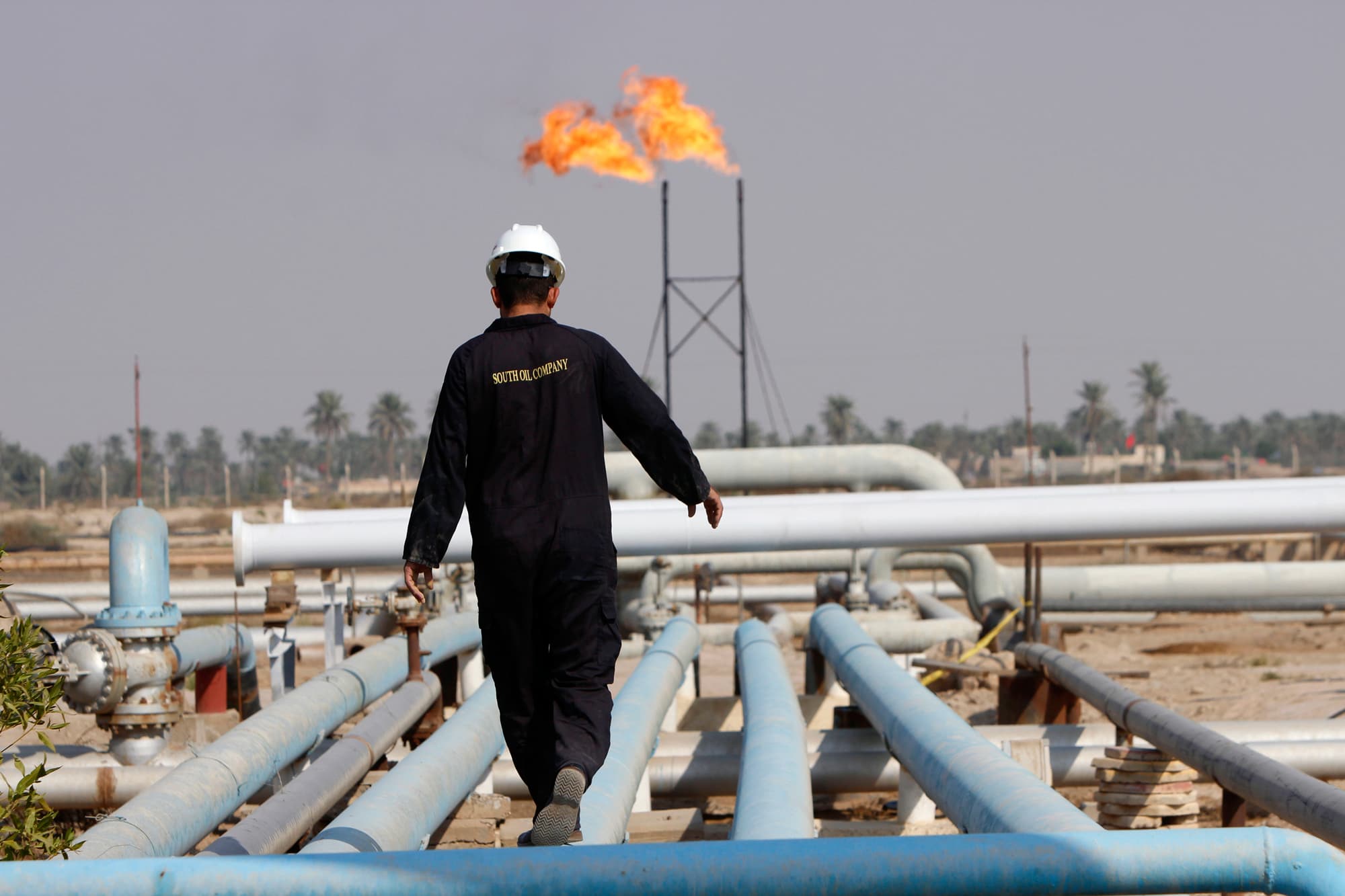A worker walks at the Nahr Bin Umar field, Iraq.
Essam Al-Sudani | Reuters
The latest flare-up in U.S.-Iran relations could bring about the end of the longest bull market ever if crude prices keep surging, slowing an already fragile global economy even further.
But investors cautioned we’re not yet at that point.
The last three U.S. recessions all came after a sharp increase in oil prices. Between July and October of 1990, crude shot up nearly 135%. The U.S. economy then entered a recession that lasted until 1991. Crude more than doubled between 1999 and 2000 before the economy fell into a recession in 2001. Oil also shot up more than 96% from its 2007 low into early 2008, just before the most recent U.S. recession.
Crude prices shot up as much as 4.8% on Friday after the U.S. killed Gen. Qasem Soleimani, a top Iranian military leader, as worries that an escalation between the two countries could batter the Middle East region and the global oil supply. Oil later gave up some of those gains to trade around 3.3% higher at $63.18 per barrel. Crude is still up more than 20% from its low around $51 in October.
The ramifications of a sustained crude price surge could be even bigger than a disruption in oil supply if a recession ensues.
“One of the things that can derail a bull market is a spike in oil prices that can cause a recession,” said Paul Hickey, co-founder of Bespoke Investment Group. “When you have higher oil prices, that’s going to impact a key cost for a lot of different businesses.”
The current bull market started on March 9, 2009, and since then stocks have been the best alternative for investors. In that time, the S&P 500 has skyrocketed more than 370%. At nearly 11 years old, it is also the longest bull market ever.
But the economy has shown signs of straining despite the optimistic outlook signaled by stocks. For example, a report on Friday from ISM showed the lowest level of manufacturing activity in December in a decade.
How will Iran respond?
Oil prices are only up about 37% in that time after a massive drop between late 2014 and early 2016, as the economy chugged along while equities surged. The shale revolution in the U.S. has made supply plentiful, keeping a lid on crude prices and in the process boosting the economy.
However, supply is tighter as of late and oil prices seem to be breaking out in the last three months.
“While there is no immediate impact on oil supply, events such as this naturally have the effect of raising the geopolitical risk premium in oil price,” Raymond James energy strategist Pavel Molchanov said in a note. “In the days and weeks ahead, we will need to watch how Iran responds, and whether its retaliation might lead to an actual oil supply disruption.”
Iran vowed to retaliate against the U.S. following Soleimani’s assassination. Iranian Foreign Minister Mohammad Javad Zarif said this action was “extremely dangerous & a foolish escalation” by the U.S. Iranian Defense Minister Amir Hatami reportedly said “a crushing revenge will be taken” for Soleimani’s death.
Market taking it relatively in stride
To be sure, the U.S. stock market took the news with relative ease. After a big drop at Friday’s open, the major averages were all down less than 1%.
Bespoke’s Hickey said oil’s current price levels are not “problematic” for the stock market. “You’d have to see a quick surge in oil prices to like the high $70s or $80 for the market to get really concerned,” he said.
Nicholas Colas, co-founder of DataTrek Research, thinks crude has a steep hill to climb before it becomes a recessionary risk that could topple the current bull market.
“The magic number is 90%. When oil prices go up 90% over a 10-to-12-month period, the U.S. has a recession,” he said. “You go through all those time frames, oil was up 90% or more, and in each of them we had a recession.”
But Colas thinks investors should remain vigilant on oil for the time being.
“We shouldn’t be complacent,” he said. “If oil starts to move towards $100 per barrel, you’ve got a problem. Period. There’s nothing good about that. Unless the U.S. economy is rip-roaring, which I don’t think anybody expects it to do, we should keep watching oil.”
